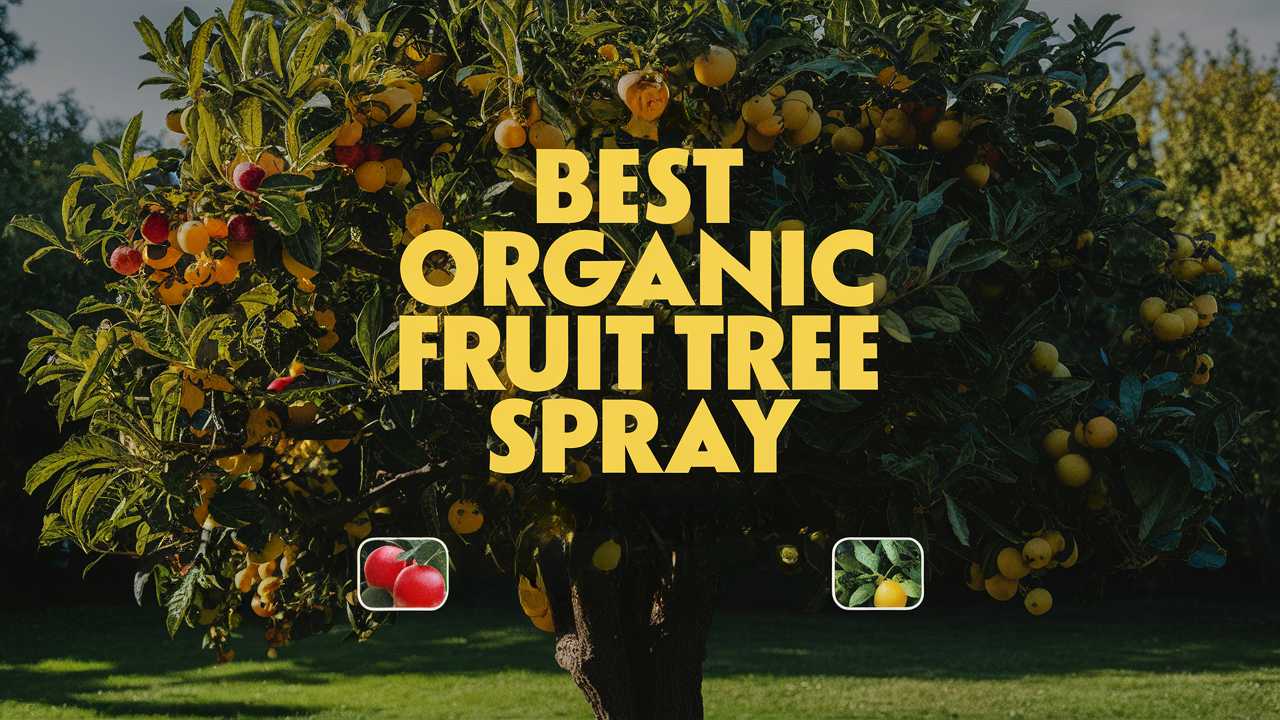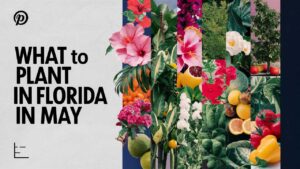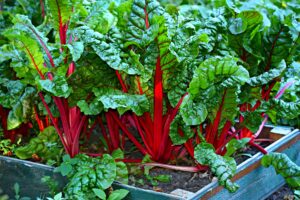This guide will explore various aspects of selecting the best organic fruit tree spray, providing you with the knowledge you need to keep your trees healthy without compromising your commitment to sustainability.
Best Organic Fruit Tree Spray
| Image | Name | Rating | Shop |
|---|---|---|---|
 | Jack’s Harvest Guard |  | |
 | Monterey MultiGuard |  | |
 | FruitShield Pro |  |
Jack’s Harvest Guard
Looking for an organic fruit tree spray that can tackle diseases and insects? Consider using Bonide Captain Jack’s Fruit Tree Spray Concentrate! This 128 oz concentrate is perfect for gardeners who want to control common fungal attacks, such as powdery mildew, blight, black spot, mold and more on their fruits, nuts, and citrus plants.
Captain Jack’s has got you covered when it comes to insect control too. This concentrate controls and repels many common garden insects like aphids, gnats, beetles, grasshoppers and other listed insects. And the best part? It’s approved for organic gardening and can be used up to time of harvest. Cold Pressed Neem Oil is the key ingredient that makes this product effective as a fungicide, insecticide, miticide, and nematicide when used as directed.
Monterey MultiGuard
This product is a great option when you’re looking to keep your fruit trees healthy and pest-free without using harsh chemicals.
The Monterey Fruit Tree Spray Plus seems to be effective in controlling both insects and fungal diseases, as mentioned in its product description. With its dual-action control, it eliminates common pests and prevents and treats various diseases. The product is also relatively easy to use, allowing for simple application via a hose or mixing with water.
FruitShield Pro
If you’re looking for a reliable and effective way to protect your fruit trees from common pests, consider using Dr. Earth 8009 32 oz Fruit Tree Insect Killer RTS spray.
This product is designed specifically for use on deciduous fruit trees, avocados and other types of fruit-bearing plants, making it a great option for gardeners with a variety of tree species. It’s easy to use; simply attach the sprayer and apply directly to affected areas as needed. Dr. Earth 8009 has a broad-spectrum formula that will kill and control over 30 different pests commonly found on fruit trees and other plants, including aphids, whiteflies, scale insects and many others, ensuring healthy growth and bountiful harvests.
TripleGuard Plant Protector
Trifecta Crop Control Insecticidal Soap stands out as an excellent natural option for fruit tree sprays. This all-natural formula effectively tackles spider mites, aphids, whiteflies, fungus gnats, and other soft-bodied pests without harming beneficial insects or the environment.
If you’re looking for a plant-based solution that’s safe for use on edible crops, Trifecta Crop Control is worth considering. The product is biodegradable, eco-friendly, and free from chemical residues, making it suitable for organic gardening. With its gentle yet potent formula, it’s perfect for controlling pests on fruit trees without compromising the health of your plants or the environment around them.
SeasonGuard Pro
This organic fruit tree spray is a top pick among gardeners who prioritize safe and effective plant care. The Bonide All Seasons Horticultural & Dormant Spray Oil is a versatile concentrate that can be used year-round to control insects and diseases in a variety of plants, including fruits, vegetables, nuts, flowers, and more.
The active ingredient, Refined Mineral Oil, is approved for organic gardening and the production of organic produce and ornamentals. This spray oil works quickly to kill insects at any stage of life, from eggs to adults, while also preventing fungal diseases like powdery mildew and leaf spot. Easy to use and requiring just a mix with water, this product is perfect for gardeners who want to protect their fruit trees without harming the environment.
FruitShield
Fruit tree owners often find themselves in a bind when it comes to dealing with pests and diseases. This is why products like the Voluntary Purchasing Group Fertilome 10131 Fruit Tree Spray can be such a lifesaver. This multi-purpose spray not only kills eggs, larval and adult insects but also prevents fungal attacks on plant tissues.
This versatile product can be used indoors or outdoors and is effective on a wide range of plants including fruits, nuts, vegetables, herbs and flowers. Its ability to control insect pests while protecting against fungal diseases makes it an excellent choice for maintaining healthy and thriving fruit trees. With its 16-ounce bottle size, this spray provides enough control to tackle even the most stubborn infestations.
Understanding Organic Fruit Tree Sprays
Organic fruit tree sprays are designed to protect trees from pests, diseases, and environmental stressors without using synthetic chemicals. These products are formulated from natural ingredients, making them safer for the environment, beneficial insects, and, most importantly, for human health. Before diving into how to choose the right spray for your needs, it’s essential to understand different types of organic sprays and their applications.
Types of Organic Fruit Tree Sprays
Insecticidal Soaps: These sprays work by suffocating soft-bodied insects like aphids and spider mites. The soaps break down the outer layer of these pests, effectively killing them without harming beneficial insects when used properly.
Neem Oil: Derived from the seeds of the neem tree, neem oil is a broad-spectrum insecticide, fungicide, and miticide. It disrupts the life cycle of insects, making it an effective preventive measure against pests. Moreover, it can help with fungal infections on fruit trees.
Horticultural Oils: These oils create a barrier that suffocates insects and can prevent certain fungal diseases. They work well against scale insects and other pests, as they can coat and smother them.
Sulfur Sprays: Sulfur is a natural fungicide that can be effective against powdery mildew and other fungal diseases. It’s also useful for controlling certain pests, but it should be used cautiously as it can harm beneficial organisms in the soil.
Bacillus thuringiensis (Bt): This naturally occurring bacterium targets specific insect larvae and is often used for caterpillar control. It’s safe for use around most beneficial insects and does not harm humans or pets.
Plant-Based Solutions: Many organic fruit tree sprays leverage herbal or plant extracts to deter pests. For example, garlic sprays or chili pepper sprays can repel certain insects due to their strong odors.
Determining Your Tree’s Needs
Choosing the best organic fruit tree spray starts with understanding the specific needs of your fruit trees. This involves a thorough assessment of the following factors:
Species of Fruit Trees
Different tree species may face different pests and diseases. For instance, apple trees are susceptible to apple maggots and scab, while peach trees can be attacked by peach leaf curl and spider mites. Familiarizing yourself with the common issues faced by your specific fruit trees ensures you select an effective organic spray tailored to those needs.
Local Pests and Diseases
Every region has its set of common pests and diseases. Conducting research on locally prevalent bugs, fungi, and pathogens can inform your choice. Speaking with local gardeners, agricultural extensions, or nurseries can provide valuable insights into what organic treatments have been most successful in your area.
Seasonal Considerations
The timing of spray application is critical. Various pests and diseases have specific life cycles, meaning that application timing can make a significant difference. Early spring might be the best time to treat certain trees for diseases, while preventative sprays for insects may work best during peak insect activity in late spring or summer. Understanding the seasonal behaviors of both your trees and local pests will guide you in your timing and choice of sprays.
Presence of Beneficial Insects
One of the principles of organic gardening is to protect beneficial insects that help control pest populations naturally. Identify which beneficial insects inhabit your garden. For example, ladybugs and lacewings are fantastic allies in fighting aphids. Before applying any spray, ensure its ingredients won’t harm these beneficial species; otherwise, you could be creating a more significant pest problem.
Assessing Product Ingredients
When choosing an organic fruit tree spray, scrutinizing the ingredients is vital to ensuring they’re safe and effective. Here’s what to look out for:
USDA Organic Certification
Always check if the product has been approved by the USDA National Organic Program (NOP). A certified organic label indicates that the product meets strict regulatory standards for organic farming practices. This certification is a solid indicator that the ingredients are safe for the environment and human health.
Active Ingredients
Examine the active ingredients in the spray. Products with simpler, fewer components tend to be safer and less likely to harm non-target organisms. Opt for products that utilize naturally derived ingredients like essential oils or plant extracts, as these usually pose lesser risks than those with synthetic compounds, even if they are technically organic.
Inactive Ingredients
Don’t overlook inactive ingredients—these can sometimes be harmful or non-biodegradable. Check for any surfactants, preservatives, or fillers that may detract from the product’s organic integrity.
Allergens and Toxicity
If you or someone in your family has sensitivities or allergies, check the ingredient list for any known allergens. Additionally, research the potential toxicity of certain compounds to ensure safety, especially if you have pets or children who frequent the garden.
Evaluating Application Methods
The effectiveness of your organic fruit tree spray significantly depends on the method of application. The ease of use, reach, and consistency of the application can affect its overall efficacy:
Ready-to-Use vs. Concentrates
Ready-to-Use Sprays: These are convenient and ideal for smaller gardens or beginner gardeners. They come pre-mixed and can be used immediately. However, they may be more expensive per ounce compared to concentrates.
Concentrates: Typically cost-effective for larger gardens, concentrates require dilution with water before use. While they can be more economical, proper mixing is essential to avoid applying too strong a solution, which could harm your trees.
Sprayers and Equipment
Investing in good-quality sprayers can make a significant difference in how effectively you apply your organic sprays:
Handheld Sprayers: Great for small areas, allowing for precise application.
Backpack Sprayers: Useful for larger gardens, they allow for mobility and extended reach without needing to carry a heavy container.
Hose-End Sprayers: These connect directly to your garden hose, providing ease of use over large areas. However, monitoring the dilution can be challenging.
Frequency of Application
The frequency of application can vary based on the product. Some may be recommended every few weeks, while others might be used only during specific conditions, like before a rainstorm to ensure the spray adheres to the leaves. Check the product label for recommendations to optimize your treatment schedule.
Conducting a Patch Test
Before applying any new spray broadly, conduct a patch test on a small part of the tree or a less visible section. This step helps determine if the spray causes any adverse reactions or damage. Wait a few days after application to observe how the tree reacts before committing to widespread use.
Following Safety Protocols
Even though organic products are generally safer than their synthetic counterparts, safety should still be a priority:
Personal Protective Equipment (PPE)
When applying any spray, including organic ones, consider wearing gloves, goggles, and a mask to protect yourself from inhaling any particles or experiencing skin irritation. Ensure the area is well-ventilated.
Environmental Considerations
Be mindful of the time of day when spraying. Early morning or late afternoon can minimize the impact on beneficial insects and reduce evaporation. Additionally, avoid applying sprays before rain, as this can wash away the treatment and negate its effectiveness.
Storage and Disposal
Store your organic sprays in a cool, dry place away from direct sunlight to maintain their effectiveness. Follow local regulations for disposal, as many organic products can still pose risks to wildlife if improperly discarded.
Reading Reviews and Seeking Recommendations
Finding the best organic fruit tree sprays can often come down to personal experience. Before making your purchase, read reviews from other gardeners who have used the product, particularly those in your region. Gardening forums, local gardening clubs, and social media groups can also be invaluable sources of recommendations.
Local Nurseries and Co-ops
Don’t hesitate to reach out to local nurseries and agricultural co-ops for their recommendations. Staff members often have first-hand experience with the products they sell and can guide you toward the most effective options based on local conditions.
Trial and Adaptation
After purchasing your chosen organic fruit tree spray, be prepared to adapt your approach based on its performance and the ongoing challenges in your garden. Perhaps a certain spray effectively manages pests, but you’re noticing some leaf damage; it might be time to switch to a different solution or style of application.
Keeping a Garden Journal
Maintaining a garden journal allows you to track what products you’ve used, when you’ve applied them, and any notable outcomes. This practice not only helps in refining your spraying schedule but also aids in establishing a pattern of success and challenges, leading to a more informed approach in subsequent seasons.
Conclusion
Choosing the best organic fruit tree spray is not just about picking a product off the shelf; it’s an informed decision shaped by understanding your garden, the pests and diseases you may face, and the specific needs of your fruit trees. By considering product ingredients, application methods, and safety protocols, you can create a healthy ecosystem that supports your fruit trees while minimizing harm to beneficial organisms.








